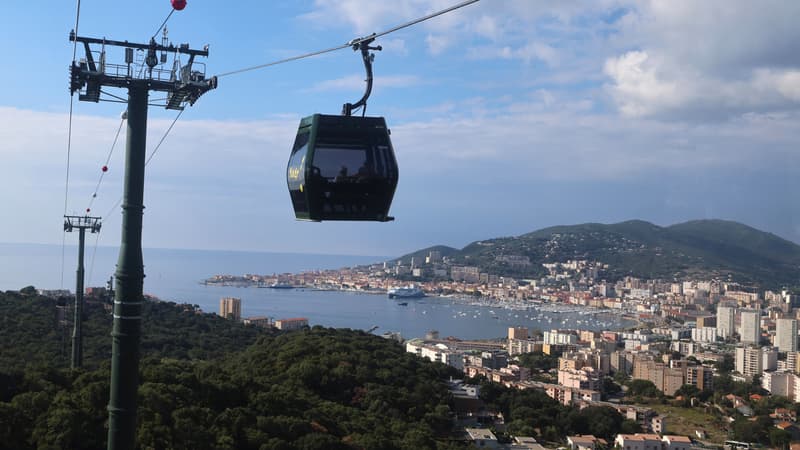Ajaccio inaugurated its urban cable car on Saturday, the fourth in France, which is not unanimous but aims to alleviate road congestion in the face of the daily difficulties of traveling in the most populated city in Corsica. The cabins rise from the promenade to cross, after a drop of 54 meters, a hill with the hospital at the top. The first users ventured on board with their families and some dressed as skiers, AFP journalists confirmed.
After Brest, Saint-Denis in Réunion and Toulouse in 2022, Ajaccio, a city of 75,000 inhabitants, becomes the first city in the Mediterranean basin to have an urban cable car, baptized “Angelo” after the name of Mount Sant’Anghulu where it is built.
The “teleport” aims to “open an entrance to a suffocated city, where a sports and entertainment center, a school for 700 students, a hospital with more than 2,000 agents, thousands of homes, shopping centers have been built… without ever anticipating the flows and accessibility limitations,” defends Stéphane Sbraggia, several right-wing mayors of the city.
Its implementation must “improve public health”: travel in Corsica is today “one of the main sources of pollution”, hence the need to “reduce car use” by promoting sustainable mobility, indicates the urban community of the country of Ajacci (Capa). Because, according to a study of the urban area, 75% of journeys of less than three kilometers are made by car.
38 million euros
With a cost of 38 million euros, 70% financed by the State, this cable car should be able to transport, over three kilometers, between 1,000 and 1,500 passengers per hour and in each direction, in 34 cabins. “I think it’s perfect!” “, rejoices Maryse Mancini, retired, at the AFPTV microphone. “This will take away a little bit of panic, just because of the traffic jams and the people who go to work in Mezzavia (…) no longer take the car,” she says.
Open from 6:30 a.m. to 10:00 p.m., it will connect in 12 minutes the coastal neighborhood of Saint-Joseph with the rapidly expanding economic and residential center of Mezzavia, with two intermediate stops, one giving access to an 8-hectare park, still under construction, with a viewpoint over the city, and the other located near the hospital, a university, the main concert hall and a stadium.
It has an operating market of 23.8 million euros in 10 years, with 28 permanent jobs, indicates Capa. But for Stéphanie Pisano, head of communications, the sums invested “are not going to be profitable, in an axis that is not necessarily the most congested or the most complicated.”
From the beginning, this project has sparked criticism, exacerbated with the proximity of the 2026 municipal elections: the autonomists from Femu to Corsica speak of “a crazy, disproportionate and largely unpopular project”, the separatists of Core in Fronte of “a chronicle of a foreseen failure” and the National Rally is concerned about an environmental “disorder” linked to deforestation in the path.
After Brest and Toulouse
Alessandro Macis, a 45-year-old security guard, is optimistic. “I want to believe in it because in several cities in France people were skeptical and in the end it works very well.” A multimodal subscription has been created (bus + future maritime shuttle + tram-train + teleport), at 30 euros per month, and the equipment would be profitable from 3,600 travelers per day, while more than 21,000 potential users have been counted, according to Capa.
In Toulouse, since its launch in May 2022, Tisséo, the public transport authority, has recorded more than 5.2 million validations, or an average of 6,000 validations per day during the week. In Brest, where the right-wing opposition had harshly criticized this election in 2016, the first urban cable car in France, which connects the banks of the Penfeld River in three minutes, made more than a million trips in 2024, compared to 864,000 in 2017, an increase of 17%, says Bibus, which manages the equipment.
Source: BFM TV


